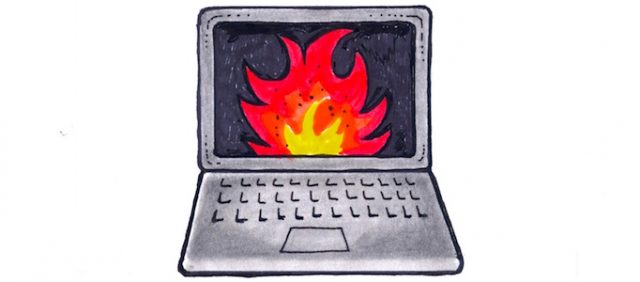
By Jake Johnson
Common Dreams (8/4/17)
The Senate on Thursday confirmed two nominees for the Federal Communications Commission (FCC)—Jessica Rosenworcel, a Democrat, and Brendan Carr, a Republican—bringing the agency back to full staff and sparking fears among Open Internet activists and lawmakers that net neutrality will soon be under threat once more.
As Politico reports, FCC Chairman Ajit Pai now “has the votes he needs to roll back” the 2015 Open Internet Order, which prevents large telecommunications companies from controlling online content and requires that all traffic be treated equally. He also has an ally in Carr, who was a lawyer for large telecom companies.
Activists and Democratic lawmakers also raised alarm on Thursday as Rep. Greg Walden (R-Ore.) met with some of the nation’s largest Internet service providers (ISPs)—including Verizon, Comcast, and AT&T—to discuss scrapping net neutrality, which some have labeled “the First Amendment of the Internet.”
“The FCC is moving to end net neutrality—which could mean giving big cable companies room to charge extra fees, block, and censor users.”
Writing for Mashable, Dipayan Ghosh and Joshua Stager summarized why Open Internet advocates should be concerned about the meeting:
“Walden says he wants to bring an end to the “ping-pong games of regulation and litigation.” But that ping-pong game only exists because the big ISPs insist on endlessly relitigating this settled law. Walden also wants to examine legislation on net neutrality, citing a dangerous and misguided draft bill from 2015. That bill would gut net neutrality and the FCC’s authority to address future problems. It would have been a disaster for the open internet and an unnecessary government intrusion into an online marketplace that is functioning well under current law. It does not need to be resurrected in 2017, and it is not the starting point for negotiation that Walden seems to think it is.”
The meeting came in the midst of an unprecedented surge in support for net neutrality at the grassroots. As Free Press, an Open Internet advocacy group, noted last month: “The Federal Communications Commission (FCC) docket for public comments on the existing net neutrality rules has already surpassed all records.”
Sens. Tom Udall (D-N.M.), Al Franken (D-Minn.), and several other prominent senators highlighted the growing support behind net neutrality in a letter asking Pai to “extend the comment period for its proposal to undo the Open Internet Order and net neutrality protections.”
In addition to the lawmakers’ effort, Change.org is circulating a petition warning of the consequences of the FCC’s proposed net neutrality rollback, and urging the public to resist.
“The [FCC] is moving to end net neutrality—which could mean giving big cable companies room to charge extra fees, block, and censor users,” the petition reads. “This decision could have global implications for the way the world shares and receives information from journalists, newsrooms, and NGOs.”
*****
This Republican Congress Critter Thinks CEOs Should Control Our Internet
By Candace Clement
FreePress (8/4/17)
Think the CEOs of the largest phone, cable and internet companies should call all the shots when it comes to Net Neutrality?
Rep. Greg Walden (R–Oregon) does. Also the chairman of the House Energy and Commerce Committee, Walden is inviting those execs to testify at a September hearing on “ground rules for the internet.”
That’s like inviting a fox to guard the henhouse. And to make matters worse, Walden didn’t invite anyone else: It’s a CEO-only hearing.
The idea that Net Neutrality is something that just needs to be sorted out between the executives of multibillion-dollar companies is insulting. The millions and millions who have weighed in on this debate care about the open internet because it enables people to organize in their communities, fight for racial justice, start their own businesses and speak for themselves.
So who will represent internet users, innovative startups and independent voices at this hearing?
Reps. Frank Pallone (D–New Jersey) and Mike Doyle (D–Pennsylvania) have some suggestions. Eight, to be precise.
On Thursday, they called on Walden and Rep. Marsha Blackburn (R–Tennessee) to invite a truly diverse range of witnesses to represent the internet’s breadth and depth. Among the eight witnesses the Democratic reps proposed adding are Blavity co-founder Jonathan Jackson, Brandi Collins of advocacy group Color Of Change, librarian Myrna Morales and Jesse Vollmar of the startup FarmLogs. The full letter from Reps. Pallone and Doyle is available here.
There’s way too much at stake in the Net Neutrality fight to ignore important voices like these. More to the point: Policymakers like Walden who want to undermine the FCC’s Title II Net Neutrality rules should back off. Real Net Neutrality means Title II. Period. And anyone who tells you otherwise is just trying to take it away.
*****
Sign This Petition To Save Our Net Neutrality
Change.org
The ability to organize grassroots movements, whether locally or across the globe, is made possible by an open Internet. Since its creation, the Internet has become the world’s megaphone for free speech, protected by the principles of Net Neutrality, which require internet service providers (ISPs) to give everyone equal access to everything you use the internet for — email, watching videos, listening to music, or signing petitions on Change.org.
Without Net Neutrality, ISPs can choose what you see online, favoring some sources or blocking others. For example, if someone launched a petition on Change.org against a company like Verizon, Net Neutrality prevents Verizon from blocking or slowing their customers’ access to our site.
The Federal Communications Commission (FCC) is moving to end Net Neutrality — which could mean giving big cable companies room to charge extra fees, block and censor users — by removing ISPs from Title II of the Communications Act, a rule that means ISPs are subjected to tougher regulations that prevent them blocking sites, creating paid “fast” lanes, and throttling internet speeds. This decision could have global implications for the way the world shares and receives information from journalists, newsrooms, and NGO’s.
Net Neutrality also prevents ISPs from creating paid “fast lanes” that would give faster delivery of content to companies who can afford to pay more. An organization or platform like Change.org that couldn’t afford those fees, couldn’t communicate with their supporters.
In the United States, there is strong bipartisan support for Net Neutrality. A recent poll conducted by Mozilla found that Republicans, Democrats and Independents overwhelmingly support these rules.
At Change.org, we believe that people everywhere should have the tools they need to make their voices heard. We’re a social good company powered by technology that empowers anyone anywhere to take action on the issues they care about. A closed off Internet means fewer ways for millions of people to make the change they want to see.
Without an internet equally accessible to everyone regardless of income or geography, we can’t continue that mission. Add your name to let Congress and the FCC know that you support an open internet.
Sign HERE

